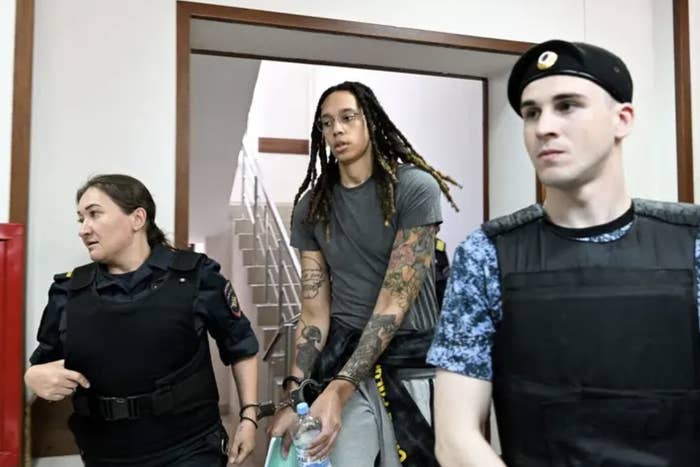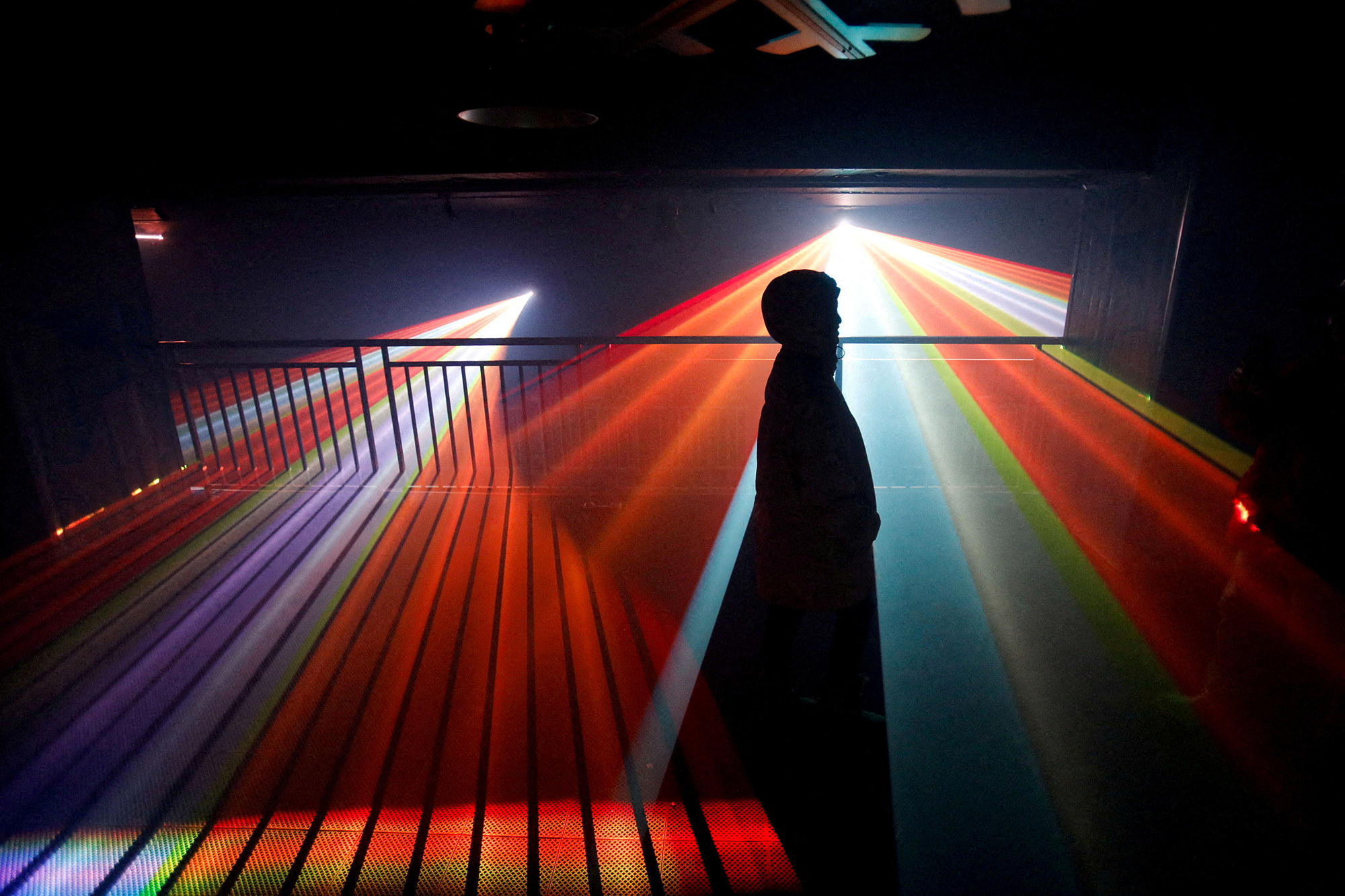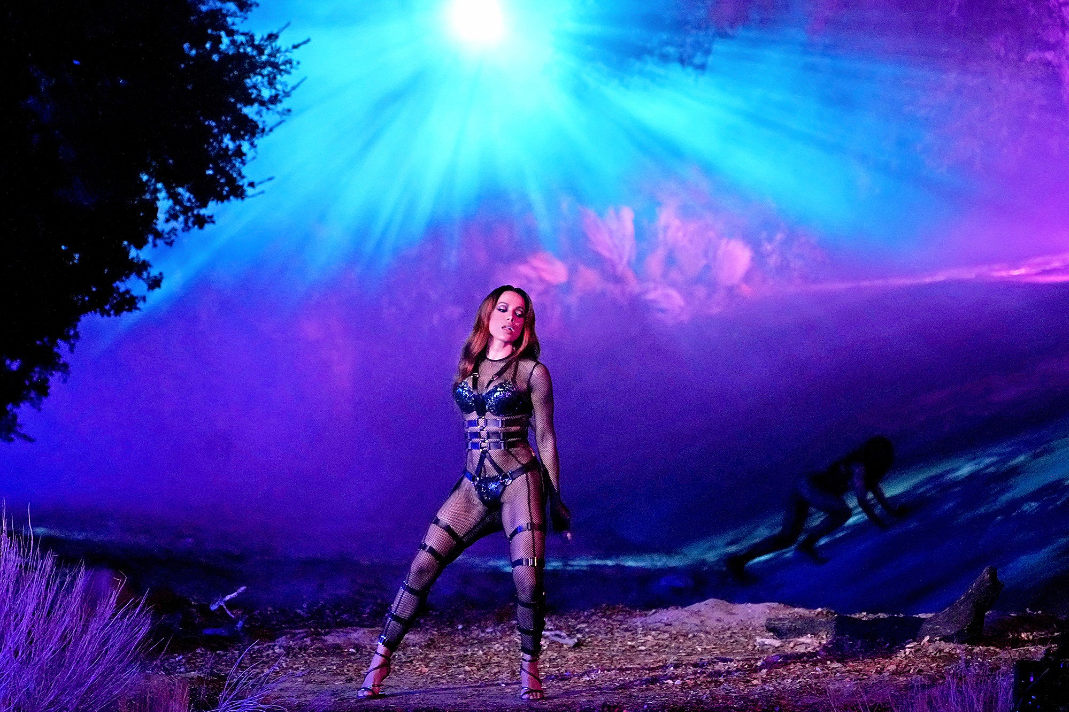This is an excerpt from Incoming, BuzzFeed News’ morning newsletter dedicated to making sense of this chaotic world we live in. Join the club here.
Brittney Griner was released from Russian prison. Paul Whelan remains detained.

Brittney Griner was released from a Russian penal colony on Thursday and is on her way back to the US, President Joe Biden said.
The WNBA player and two-time Olympic gold medalist had been detained since February when she was arrested at a Moscow airport with vape cartridges of hashish oil in her luggage. Her arrest took place just weeks before Russia invaded Ukraine, and she was sentenced to nine years in prison.
According to CNN and CBS, Griner was released as part of a prisoner swap for Russian arms dealer Viktor Bout. Paul Whelan, a former Marine who has been detained in Russia since 2018, was not released as part of the deal. "Sadly, for totally illegitimate reasons, Russia is treating Paul’s case differently than Brittney’s," Biden said. "And while we have not yet succeeded in securing Paul’s release, we are not giving up — we will never give up."
Cherelle Griner, Brittney’s wife, said the two of them “will remain committed to the work of getting every American home, including Paul, whose family is in our hearts today as we celebrate BG being home."
The campaign to bring Brittney Griner home will now advocate for 13 other Americans incarcerated abroad, her agent said
The We Are BG coalition — led by Cherelle Griner with Brittney Griner’s agent Lindsay Colas — will continue to do its part in reuniting families with their relatives who are being held overseas. In addition to Whelan, Colas said the coalition will advocate for 12 other Americans: Emad Shargi, Siamak Namazi, Morad Tahbaz, and Shahab Dalili in Iran; Luke Denman, Airan Berry, and Eyvin Hernandez in Venezuela; Kai Li and Mark Swidan in China; Majd Kamalmaz in Syria; Jeffery Woodke in Mali; and Paul Rusesabagina in Rwanda.
In a statement to CBS News, Paul Whelan’s brother David Whelan said he is “so glad” to hear of Griner’s release and that the family does "not begrudge Ms. Griner her freedom." “As a family member of a Russian hostage, I can literally only imagine the joy she will have, being reunited with her loved ones, and in time for the holidays,” he wrote.
SNAPSHOTS
Understanding stiff-person syndrome, the extremely rare neurological disorder that Céline Dion was recently diagnosed with. There aren’t clear risk factors that make someone more likely to develop SPS, but twice as many women as men are diagnosed with the condition, according to the National Institutes of Health.
The "Boy in the Box" victim who was found dead in 1957 has finally been identified. Over the years, thousands of leads and hundreds of theories emerged regarding who the boy was and what happened to him. There is still a $20,000 reward for information that leads to an arrest or conviction in this case.
Prince Harry said members of the royal family treated Meghan Markle's media harassment as a "rite of passage." “The fact that I was dating an American actress was probably what clouded their judgment more than anything else at the beginning,” Harry said in the couple's new Netflix docuseries. “‘Oh, she’s an American actress, this won’t last.’”
Former Grey's Anatomy writer Elisabeth Finch admitted she lied about having cancer, her brother's suicide, and having an abortion because she "needed support and attention." Finch revealed she was actually first exposed by her wife, Jennifer Beyer.
The harrowing data, intellectual property, and identity concerns that come with turning your selfies into AI art

This week, Instagram is swarming with artsy illustrations of your friends suddenly looking like a watercolor painting or a character from a new Marvel film. The Lensa app, created by Prisma Labs, uses artificial intelligence and photos uploaded by users to generate unique images based on their likenesses. It costs $7.99 for 50 pictures, up from $3.99 just a few days ago.
But as people share digital portraits of themselves created with Lensa, some experts have raised concerns about data privacy, artist rights, and how the app seems preoccupied with giving huge boobs to every woman who uses it.
Prisma’s terms and conditions state that it “retain all rights in and to your user content,” meaning that the company owns the rights to any digital artwork made from your selfies in the app. A spokesperson from Prisma Labs told TechCrunch that the company deletes user photos from its cloud services — after using them to train its AI.
Additionally, Lensa's technology works by pulling publicly available images from all over the internet — Google Images, DeviantArt, Getty Images, Pinterest, and so on. Dozens of artists have spoken out about not getting paid or credited for work that appears in the database. And finally, AI art has faced criticism for sexualizing women and anglicizing people of color. People have said that the app failed to capture their facial features, making them appear whiter than they really are. Fat people noted that the app makes them look thin.
So, should you pay $8 to let an app transform your photos into digital illustrations? Hmm.
IMAGE OF THE DAY

How Anitta became the queen of Latinx music

Even before she was on the world stage, Brazilian pop star Anitta has always stood out for her frankness and vulnerability, Alessa Dominguez writes.
In interviews, she’s been open about surviving sexual abuse and talked about her queerness and open relationships. In the lead-up to Brazil’s 2022 national election, she spoke out against far-right-wing then-president Jair Bolsonaro and threw her support behind the eventual victor and current president, Luiz Inácio Lula da Silva. Her hits, like “Show das Poderosas” and “Lobby,” emphasize sexual agency and are packaged with transgressive panache.
It’s all garnered a big, devoted fanbase. Anitta’s videos routinely get hundreds of millions of views, and she has billions of streams on Spotify. She’s also accrued 63 million Instagram followers and 21 million TikTok followers.
But Anitta’s rise also captures tensions within Latinidad. Over the past couple of years, there has finally been a reckoning with the anti-Black racism that permeates the Latinx music industry, and the multiracial diva became a controversial symbol of this discourse. As her star rises worldwide, Anitta herself has seemingly been embraced more fully by the US industry than the Latinx one.
In spite of it all, Anitta’s pop stardom is unprecedented, and her narrative as a mixed-race woman in charge of her sexuality still a rarity. "I was born and raised in the ghetto of Brazil,” she said in her acceptance speech after winning MTV’s Best Latin Artist award. “For whoever was born there, we never would think this was possible. So thank you so much.”
Still reading, eh? Seems like you might want to get this in your inbox. No pressure though. Just some food for thought.
